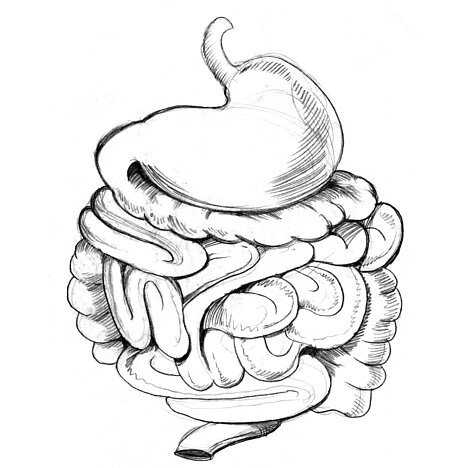Intestinal peristalsis

Intestinal peristalsis is the movement of the muscles in the digestive tract that transports food through the stomach and intestines. Intestinal peristalsis is important for digestion and the elimination of waste products.
In this article, you will learn how intestinal peristalsis works in dogs, what factors can influence it and how you can promote your dog's intestinal health.
How does intestinal peristalsis work in dogs?
Intestinal peristalsis in dogs is similar to that in humans. The muscles in the stomach and intestines alternately contract and relax to push the food towards the rectum. Digestive enzymes, bile acids and other fluids are also secreted to break down the food and facilitate nutrient absorption.
The speed and strength of intestinal peristalsis depends on various factors, such as the type and amount of food, stress levels, hormone levels, age and health of the dog. It normally takes between 6 and 10 hours for food to pass through the entire digestive tract.
What can disrupt intestinal peristalsis in dogs?
Intestinal peristalsis in dogs can be disturbed by various causes that can lead to digestive problems such as diarrhea, constipation, flatulence or vomiting. The most common causes include
- Incorrect diet: a diet that is too fatty, too low in fiber or too intolerable can slow down or speed up intestinal peristalsis and lead to inflammation or irritation of the intestinal mucosa.
- Stress: Stress can influence the release of hormones, which in turn regulate intestinal peristalsis. Stress can also lead to increased gas formation or a reduced appetite, which impairs digestion.
- Medication: Some medications can inhibit or stimulate intestinal peristalsis as a side effect. These include, for example, painkillers, antibiotics, dewormers or laxatives.
- Diseases: Various diseases can disrupt intestinal peristalsis in dogs, such as infections, parasites, tumors, allergies or chronic diseases such as diabetes or kidney failure.
How can you promote your dog's intestinal peristalsis?
To promote your dog's intestinal peristalsis and prevent or alleviate digestive problems, you can take the following measures:
- Feed your dog a species-appropriate diet: choose a high-quality dog food that is tailored to your dog's needs. Make sure it has a balanced composition of protein, fat, carbohydrates, fiber, vitamins and minerals. Avoid foods that are too fatty, too sweet or too spicy, as well as foods that are toxic to dogs.
- Give your dog enough water: Water is essential for good digestion and healthy intestinal flora. Make sure your dog always has fresh water available and encourage him to drink.
- Provide regular exercise: Exercise stimulates blood circulation and metabolism and helps to stimulate intestinal peristalsis. Take your dog for a walk at least twice a day and offer him play and activity opportunities.
- Reduce stress: Stress can have a negative effect on your dog's digestion. Therefore, try to minimize or eliminate stress factors for your dog. Create a calm and safe environment in which he feels comfortable. Give him enough attention and affection, but also respect his rest periods.
- Consult a vet: If your dog has persistent or severe digestive problems, you should see a vet to determine the cause and get appropriate treatment. Sometimes natural remedies such as herbs, probiotics or enzymes can also help to support intestinal peristalsis.
Intestinal peristalsis is an important factor for your dog's health and well-being. With a species-appropriate diet, sufficient water, regular exercise, stress reduction and veterinary care, you can help ensure that your dog has optimal intestinal function.
The authors assume that a veterinarian should be consulted if an animal is ill and that medication should only be taken after consultation with a doctor or pharmacist. Only an individual examination can lead to a diagnosis and treatment decision.
We help you find the nearest vet → This way